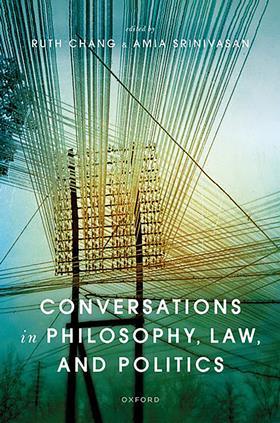Conversations in Philosophy, Law, and Politics
Edited by Ruth Chang and Amia Srinivasan
£90, Oxford University Press
★★★★✩
This weighty intellectual tome originated in a planned conference at Oxford University, in which the organisers sought to pair younger theorists in philosophy, law and politics with established authors. They asked the former to write on a topic of their choice and the latter to write responses. In the event, the physical conference fell victim to the Covid-19 lockdown, but the thinking went ahead nonetheless. The resultant papers have been collected in an attractively presented hard-cover volume.
The list of contributors includes formidable names, including Catharine A. MacKinnon, Onora O’Neill, Philip Pettit, Thomas Scanlon and Jeremy Waldron. A wide range of subjects is covered. Those likely to be of most interest to lawyers include the climate crisis, AI and democratic legitimacy, the rule of law, ‘cultures of trust’, responsibility for wrongdoing, ‘responsibility as owning the normative footprint of a wrong’, reasonableness, failures of perception, duty, plural obligations, equality, intersectionality, gender and power relations, pornography, legislation, and arguments a contrario.

There is a welcome array of perspectives in the book, though for all their expertise in modern philosophy, political theory and jurisprudence, some of the contributors might have benefited from a greater historical perspective. The contributions on gender and power relations, for example, are heavily assumption-laden, deviating from previous thinking with little acknowledgement or argument and barely a mention of well-known controversies on the subject. Some feminists reject modern notions of gender as based on the very patriarchy and stereotypes second-wave feminism opposed. At present no one can know how such debates will be resolved or if they will even be recognised by later generations, which should infuse current academics with some degree of humility and caution.
Inevitably, given the scope and number of contributors, the quality of the essays varies. Yet the work is intended to ask or provoke as much as answer, and it fulfils that brief. And while the essays are mostly theoretical, some have a certain immediacy: the discussion of a culture of trust underpinning the rule of law, for example, in the light of fractures in British society evident in recent civil disturbances.
Busy practitioners are unlikely to have time to ponder such abstract issues, let alone wade through almost 600 pages of academic writing. But for those missing their days studying jurisprudence, or who are attracted to considering or writing more theoretically on legal issues, this book will be of interest.
James Wilson FRHistS is an independent legal author. His most recent book is Lord Denning: Life, Law and Legacy (Wildy, Simmonds & Hill, 2023)































No comments yet